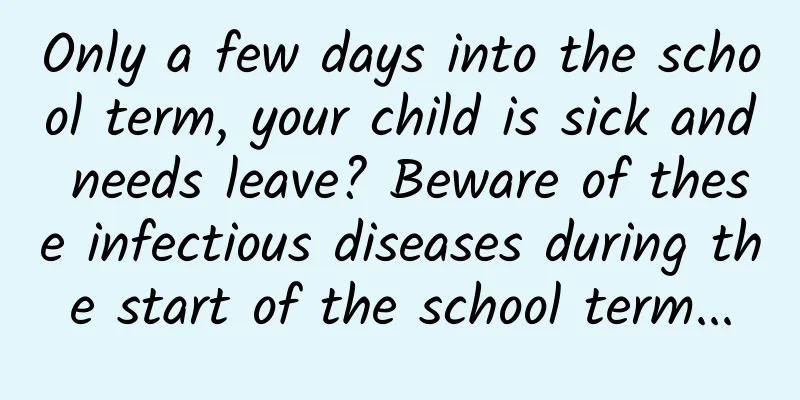Only a few days into the school term, your child is sick and needs leave? Beware of these infectious diseases during the start of the school term...

|
Looking forward to it Finally, the kids are back to school. Many parents I guess they are all like me. I wake up laughing when I sleep ↓↓↓ The result is that I can't laugh for a few days Some parents said My baby has a fever, vomiting and diarrhea... To ask for leave How come school only starts a few days ago? What if the child is sick? It is now the transition from winter to spring, and the climate is changing repeatedly. It is the season when many infectious diseases are prevalent. Below, we have organized Several common infectious diseases Everyone must pay attention! influenza Influenza is an acute respiratory infection caused by influenza viruses. Influenza viruses are easily mutated, spread rapidly, and can cause seasonal epidemics every year. It is mainly transmitted through droplets formed by sneezing and coughing, and can also be transmitted through direct or indirect contact with mucous membranes such as the mouth, nose, and eyes. The main symptoms include high fever (body temperature can reach 39-40℃), sore throat, cough, muscle aches, fatigue, etc. Norovirus diarrhea Norovirus infectious diarrhea is a viral gastrointestinal disease caused by Norovirus. It is characterized by rapid onset, rapid spread, and a wide range of involvement. It is very easy to spread in collective units such as childcare institutions and schools and cause outbreaks. There are many ways of transmission. Eating or drinking food or water contaminated by norovirus or coming into contact with patients or their vomit can cause infection. The main symptoms are nausea, vomiting, abdominal pain, diarrhea, and some patients also have a low fever. Vomiting is common in children, and diarrhea is common in adults, with loose or watery stools. chicken pox Chickenpox is a highly contagious acute respiratory infectious disease caused by the varicella-zoster virus. Children and adolescents are susceptible to the disease. It can be transmitted through respiratory droplets, or through contact with the patient's herpes fluid or objects contaminated with the virus. In the early stage, symptoms of upper respiratory tract infection such as fever, headache, and sore throat may appear. Then a rash will appear, which first appears on the trunk and head, gradually spreads to the face, and finally to the limbs, and is often very itchy. Macules, papules, herpes, and scabs can be seen in the same area, which is a manifestation of "four generations living under one roof". Hand, foot and mouth disease Hand, foot and mouth disease is a common childhood infectious disease caused by a variety of enteroviruses, mainly affecting children aged 5 and under. Infection can be caused by drinking or eating water and food contaminated by the virus, inhaling the patient's respiratory secretions, or touching toys, towels and other items contaminated by the virus. The main clinical manifestations are fever, scattered herpes on the oral mucosa, maculopapular rashes and herpes on the hands, feet, mouth and buttocks. It may be accompanied by cough, runny nose, loss of appetite and other symptoms. How should schools and families prevent these infectious diseases? Let’s learn together below! Should schools do this? 1. Implement the morning and afternoon inspection system. If students or children are found to have symptoms such as fever, cough, sore throat, vomiting, diarrhea, rash, etc., parents should be notified immediately and they should be sent to the hospital for treatment as soon as possible. 2. Strictly manage cases and do a good job in registering and reporting absenteeism due to illness and tracing the causes of illness. 3. Strengthen health monitoring of canteen employees, as well as food and water safety management. 4. Strengthen the publicity of knowledge on prevention and control of infectious diseases in spring. Carry out health knowledge education for students and children through broadcasting, bulletin boards, WeChat, etc. 5. Keep the air circulating and the indoor and outdoor areas clean, such as classrooms, lounges, dance rooms, reading rooms, etc. 6. Regular cleaning and disinfection. Toys, personal hygiene utensils, tableware and other items should be cleaned and disinfected every day; the ground, door handles, stair railings, tabletops and other surfaces should be wiped and disinfected; toilets should be cleaned and disinfected; if school buses are equipped, they should be kept clean and the door handles, seats, handrails, and floor of the school buses should be disinfected every day. What should families and individuals do? 1. Pay close attention to your child's physical condition. If your child has fever, cough, sore throat, vomiting, diarrhea, rash, etc., he or she should be temporarily suspended from school, seek medical treatment in a timely manner according to the condition, and communicate with the school. 2. Educate children to develop good personal living habits. Cover your mouth and nose with tissues, towels or elbows when coughing or sneezing; wash hands frequently, exercise moderately, maintain a regular schedule; add or remove clothes in time to prevent catching a cold. 3. When going to crowded public places such as hospitals, subways, and shopping malls, you should wear a mask scientifically and maintain interpersonal distance. 4. Pay attention to the hygiene of the home environment. Ensure indoor ventilation, home hygiene, cleaning and disinfection; if there is a sick child at home, during the period of home isolation and treatment, the floor, home surfaces, and items or surfaces contaminated by the sick child should be disinfected. Try to avoid going out and contact with other children to avoid infecting others. 5. Do not drink raw water and food should be cooked thoroughly. 6. Vaccination: Vaccination is one of the most economical and effective measures to prevent infectious diseases. Children who meet the conditions are recommended to take the initiative to receive influenza, EV71, chickenpox and other vaccines to enhance their immunity. Source: Dongguan Disease Control, Prevention World |
<<: If my child doesn’t grow taller, can I use growth hormone?
Recommend
Can I eat watermelon after having an abortion?
Fruits are a favorite of female friends. Eating f...
Will I have stomach pain after medical abortion?
Choosing abortion may be a difficult choice, whic...
Catheterization procedure for female patients
Catheterization for female patients is a surgical...
Female breast structure
The breast structure of female friends is relativ...
[Health Lecture] "Medicine" keeps you safe - How should the elderly use medicine?
In order to ensure the popularization effect of l...
Tips for removing pregnancy spots on the face
Having spots on the face is something that no wom...
How to know if the fetus has stopped growing at 16 weeks of pregnancy
How to know if the fetus has stopped growing at 1...
How to decorate a long corridor? How to decorate a long corridor?
We all know that different apartment types have d...
Why do small blisters appear in the vagina?
If you notice small blisters growing in the vagin...
Will anal fistula recur after surgery?
The prevalence of anorectal diseases caused by an...
What are the traditional Chinese medicine treatments for acute mastitis?
In daily life, most breast diseases occur during ...
I still have abdominal pain the next day after I removed the IUD. Why?
Now our country has opened up to second births, s...
How much does the belly circumference grow during pregnancy?
The size of the abdomen of every woman during pre...
How should pregnant women treat colds in the early stages of pregnancy?
In the early stages of pregnancy, women's res...
Right rib pain in late pregnancy
Some people are very lucky when they are pregnant...









